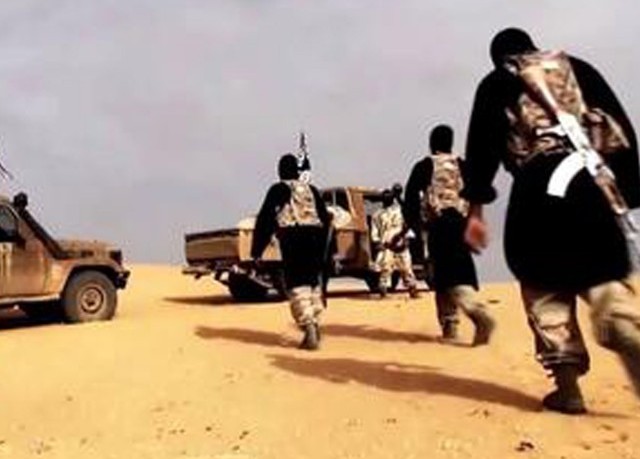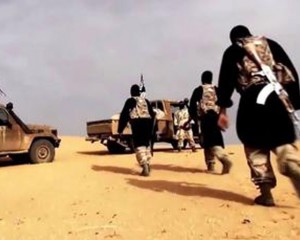STRATFOR
Al Qaeda in the Islamic Maghreb fighters are shown in the Sahara Desert. Rumors suggest that Algeria has begun taking action against militants in neighboring countries despite its policy of nonintervention. (Al-Andalus Media Productions)
Forecast
* Heightened militant activity in North Africa, coupled with regional governments’ inability to combat it, will greatly increase the security threats Algeria faces.
* Unable to patrol and protect the entirety of its border, Algeria will find it more difficult to maintain its policy of nonintervention in the long run.
* A strained economy and uncertainty surrounding Algeria’s political succession, however, will delay Algiers’ efforts to protect its security interests outside its borders.
Analysis
Algeria prides itself on its vehement respect for other states’ sovereignty, but a mounting militancy threat on its doorstep is putting Algiers’ long-standing policy of nonintervention to the test. Its neighbors, many of which are ruled by unstable governments, are incapable of combating the growing militant activity on their own. Once Algeria achieves some stability itself by choosing its next president, the country may be forced to abandon its traditional foreign policy approach in favor of a more assertive military stance beyond its borders.
A History of Nonintervention
The tenets of nonintervention have been deeply entrenched in Algerian foreign policy since the country gained its independence in 1962. The former French colony’s long and bloody quest for sovereignty planted the seeds of opposition to external meddling, culminating in the inclusion of a formal nonintervention policy in the Algerian Constitution in 1976. Algeria’s anti-interventionist attitude was strengthened in 1991, when Islamists widely believed to be backed by Saudi Arabia, Jordan and Iran attempted to launch a coup in the country.
Maintaining a steadfast neutrality in other countries’ conflicts serves Algeria’s strategic interests. If Algiers, for instance, were to help its neighbors battle their own Islamist insurgencies, it would do so at the risk of becoming a target for those insurgents. Moreover, Algeria could find itself on the wrong side of history if it were to intervene on behalf of a particular group, only to see that group ousted by a rival.
Instead, Algiers has sought to stay out of other states’ affairs, better positioning itself to lead the North African region in the process. Mediation has proved a particularly useful route to influence. Algeria played a key role in early talks to resolve Mali’s Tuareg rebellions in 1990, 2006 and 2014; it negotiated peace agreements in Eritrea and Ethiopia; and it facilitated resolution of the U.S.-Iran hostage crisis after the overthrow of Shah Mohammad Reza Pahlavi. More recently, Algeria has participated in the U.N.-sponsored dialogue on the Libyan civil war, and, according to Stratfor sources, it has mediated talks between Turkey and Iran on the future of Syria. By concentrating on brokering peace, Algiers has become a dominant regional actor without assuming the risks associated with intervening elsewhere in the name of security.
The Threat Moves Farther Afield
For most of its history, Algeria’s noninterventionist strategy has suited its needs well. After all, the bulk of the country’s security challenges have come from within, primarily in the form of uprisings by Algeria’s Berber minority or homegrown militant Islamist groups, such as the Armed Islamic Group of Algeria and the Salafist Group for Preaching and Combat. Consequently, Algeria has consistently developed its military with an eye to addressing internal threats and budgetary priorities.
But the security threats Algiers faces today are very different and exist largely outside Algeria’s borders. The Islamist militants who plagued the country for much of its past were, for the most part, forced to flee amid an intensified counterterrorism campaign that took place after Algeria’s civil war ended. They took shelter in surrounding states such as Mali, Mauritania and Niger. When former Libyan leader Moammar Gadhafi fell in 2011, the groups gained access to weapons and havens on an unprecedented scale.
In 2013, the consequences of their ascent became clear to Algeria when Mokhtar Belmokhtar’s Mulathameen Brigade attacked the Tigantourine natural gas facility near Ain Amenas. The incident triggered an unparalleled debate over whether Algeria should intervene militarily in other countries to mitigate the risks emanating from the Sahel, something Algeria’s Islamists had never before been able to achieve, even at the height of the country’s civil war.
So far, the Algerian government has tried to resolve the issue by better insulating the country from attacks by groups located abroad. To that end, Algiers has beefed up its border security with tens of thousands of additional soldiers and paramilitary forces. It has also put the military, rather than the police, in charge of border operations and closed 5,955 kilometers (3,700 miles) of Algeria’s borders with Mauritania, Mali, Niger and Libya. To prevent incursions from the desert, the army has set up 20 monitoring stations on Algeria’s southern border, aided by recent acquisitions of modern military equipment, including drone and surveillance technology.
But despite Algiers’ efforts and sophisticated military, the country’s long and porous borders have proved nearly impossible to seal. Weapons and people are frequently reported to be entering Algeria from the south and east, while suicide bombings continue to damage military posts across the country. As threats continue to build on all sides, Algeria may have to find a more proactive solution to the region’s militant problem.
Targeted and Collaborative Measures
The solution will not necessarily come in the form of large-scale military interventions. More likely, Algeria will opt to ramp up its airstrikes, cross-border raids and coordination with other countries combating North African militant groups, including France. Though Paris is in some ways Algiers’ competitor in the region, the two can certainly find room to cooperate on matters of mutual tactical interest. The same can be said of Algeria’s neighbors: Algiers has a long history of working with other states to clean up the Sahel. In 2010, Algeria, Mali, Niger and Mauritania set up a joint committee to coordinate their counterterrorism operations, though regional turmoil in the years that followed largely overwhelmed the committee’s capacity.
Though the Algerian Constitution technically prohibits the military from participating in operations abroad, Algeria has been known to occasionally deploy its forces beyond its borders. The most notable instance was its 1963 war with Morocco, though it clashed with Moroccan forces again in the Western Sahara in 1976. During the Arab-Israeli War, Algeria also sent some 3,000 soldiers to assist Egypt in its fight against Israel. These are exceptions to the rule, however, and on the whole Algeria’s military rarely strays from internal issues. Indeed, even when the Movement for Unity and Jihad in West Africa attacked a military post in Tamanrasset in 2012, Algerian forces did not pursue the group to its stronghold in northern Mali.
In the past few years, though, unconfirmed reports suggest that Algeria has begun taking action against militants in neighboring countries. According to the rumors, Algiers sent special operations forces to Niger and Mali on several occasions, and a military leak in July 2014 claimed that 5,000 Algerian troops had been deployed to Libya. Stratfor sources also reported that Algiers considered providing intelligence to the Western coalition that intervened in Libya, looking into U.S. and French requests for operational assistance as early as September 2014.
Short-Term Obstacles to Taking Action Abroad
Given the considerable (and growing) capability of the Algerian military, increasing its security operations abroad would not be difficult. Since its independence, Algeria has prized its military strength, and in 2009 it surpassed South Africa as the continent’s largest defense market. Four years later, Algeria became the first African country to spend more than $10 billion on its military. Today it devotes roughly that much each year to defense. As a result, the Algerian military is one of the largest in the region, and it continues to be well-supplied with Russian equipment.
But overcoming the political and economic constraints to military assertiveness will be a bigger challenge.
Algeria’s economy continues to rely heavily on oil and natural gas exports, but those commodities are no longer fetching the high prices they once did. Since oil prices plummeted in 2014, Algiers has had to use more and more of its foreign currency reserves to make up for shortfalls in revenue. Indeed, Algeria’s budget deficit nearly doubled between 2014 and 2015, jumping from 6.2 percent to 11.5 percent. So although Algiers will continue to invest in its military, it will be wary of engaging too heavily in external security threats lest it become overextended and incapable of defending the Algerian homeland.
Meanwhile, political uncertainty abounds as Algerian leaders sort out a succession plan for the country’s ailing president, Abdel Aziz Bouteflika. Negotiations among the Algerian political, military and business elite will likely be protracted as different contenders jockey for a role in the next government. But after the dust settles and Algeria’s new president consolidates power, Algiers will be free to use its military more aggressively, tamping down the many varied threats that lie just outside its borders.
Lead Analyst: Toba Hellerstein








